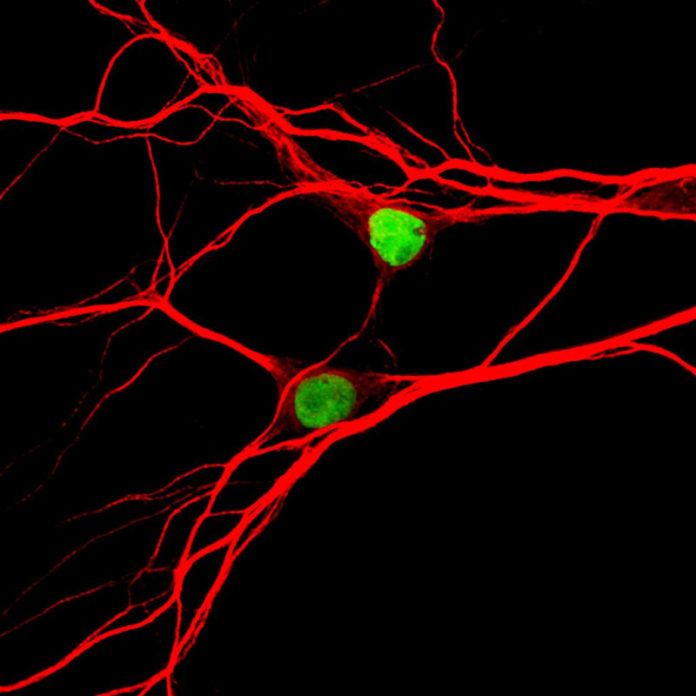
UNC School of Medicine researchers have found for the first time a biochemical mechanism that could be a cause of “chemo brain” — the neurological side effects such as memory loss, confusion, difficulty thinking, and trouble concentrating that many cancer patients experience while on chemotherapy to treat tumors in other parts of the body.
The research, published in the Proceedings of the National Academy of Sciences, shows how the common chemotherapy drug topotecan can drastically suppress the expression of Topoisomerase-1, a gene that triggers the creation of proteins essential for normal brain function. Specifically, the drug tamps down the proteins that are necessary for neurons to communicate through synapses. However, the researchers found that the protein levels and synaptic communication return to normal when the drug is removed.
“There’s still a question in the cancer field about the degree to which some chemotherapies get into the brain,” said Mark Zylka, PhD, associate professor of cell biology and physiology and co-senior author of the PNAS paper. “But in our experiments, we show that if they do get in, they can have a dramatic effect on synaptic function. We think drug developers should be aware of this when testing their next generation of topoisomerase inhibitors.”
The researchers also suggest that if these synaptic enzymes are affected during brain development and throughout life, then the result could be long-term neurodevelopmental problems, such as those found in people with Autism Spectrum Disorder. Essentially, the brain would be wired incorrectly. Topotecan is not the only “environmental factor” that can suppress the genes linked to autism. Research to quantify these biochemical effects in animals is ongoing at UNC.
The PNAS study comes one year after Zylka and UNC colleague Ben Philpot, PhD, professor of cell biology and physiology, reported in Nature that topotecan halted the expression of unusually long genes in neurons — the same synaptic genes linked to autism. This discovery led them to investigate how topotecan affects the specific topoisomerase enzymes in cancer cells and in neurons.
In the PNAS paper, the researchers describe how topotecan hits its intended target — the topoisomerase proteins that are integral for cell division, a hallmark of cancer cells. But these proteins exist to varying degrees in many cell types.
UNC postdoctoral fellow Angela Mabb, PhD, used several biochemical, electrophysiological, and imaging techniques to study how cortical neurons of mice react to topotecan. She found that the drug depleted the synaptic proteins that extremely long genes encode — proteins including Neurexin-1, Neuroligin-1, Cntnap2, and GABAAβ3. This depletion drastically dampened the spontaneous synaptic activity and transmission of signals between neurons. But the main bodies of the neurons remained unaffected.
“The cells seemed quiet, as if in a dormant state,” Mabb said. “But they remained healthy. And once the drug was washed out, the synaptic function returned to normal.”
Philpot added, “Although we stress that our experiments are with cells in a dish, our results are consistent with the kinds of side effects that cancer patients report during chemotherapy.”
These experiments used only topotecan, but there’s an entire class of topoisomerase inhibitors. Many other similar drugs are now in development and scientists have already found that these drugs can effectively penetrate the blood-brain barrier.
“Many in the cancer field are focused, as they should be, on whether a drug can kill a tumor, not what the cognitive side effects might be,” Zylka said. “But this study provides insights into potential serious side effects of drugs used to treat various forms of cancer. It is very good to know that at UNC we have a big effort to study patient-reported outcomes during therapy so that we can balance care for the whole person.”
Story Source:
The above story is based on materials provided by University of North Carolina School of Medicine. Note: Materials may be edited for content and length.
Journal Reference:
- Angela M. Mabb, Paul H. M. Kullmann, Margaret A. Twomey, Jayalakshmi Miriyala, Benjamin D. Philpot, Mark J. Zylka. Topoisomerase 1 inhibition reversibly impairs synaptic function. Proceedings of the National Academy of Sciences, 2014; 111 (48): 17290 DOI: 10.1073/pnas.1413204111
